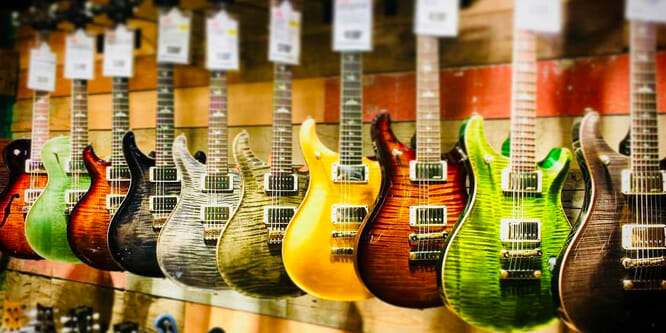
Photo: Guitar Center
Music stores play the blues as consumers play on(line)
Online selling has taken its toll on the selling of guitars. But the CEO of Gibson Guitars, Henry Juszkiewicz, believes the in-store experience at music stores is also partly to blame.
In an interview with Billboard, Mr. Juszkiewicz vexed that music stores have little seating, are generally unwelcoming to women and often located in seedy districts that turn off families. He wondered why the most expensive guitars hang high on walls while Apple has no problem providing easy access to its priciest items. Staff often lacks knowledge of the latest recording technology, and many stores are “afraid of e-commerce” amid complaints around showrooming, he asserts.
Part of the problem is that electric guitars haven’t evolved since their arrival in the fifties due to the influence of “purists,” and innovation is required to reach a new generation of players. Said Mr. Juszkiewicz, “Kids are out there creating their own music and their own videos; we have to find a way to be a part of their lives.”
A new article from Acoustic Guitar magazine on the state of the independent music store encouragingly said some stores are using online engagement to motivate consumers to come in and try a guitar. Retailers are adding demonstration videos and 360-degree imagery to websites, and some stores are successfully using Reverb, a bidding site similar to eBay. Starter packages (including instrument, accessories and instructional books) can be helpful in encouraging beginners.
An article last year in The Washington Post exploring the declining popularity of the electric guitar pointed to the growth of School of Rock to nearly 200 branches as a potential path to encourage today’s youth to pick up the guitar.
But both the Acoustic Guitar and Post articles lamented that fewer teenagers and Millennials are interested in the electric guitar due to changing musical tastes. A lack of “guitar heroes” to inspire kids remains a hurdle.
What’s worse, yesteryears’ guitar buyers, largely Boomers, are shedding their vintage collections. Richard Ash, CEO of Sam Ash, the largest chain of family-owned music stores in the U.S., told the Post, “Our customers are getting older, and they’re going to be gone soon.”
Discussion Questions
DISCUSSION QUESTIONS: Do you see ways music stores can reimagine in-store selling and online engagement to help revive the electric guitar and overall instrument category? What’s the best path to connect with teenagers and Millennials?
